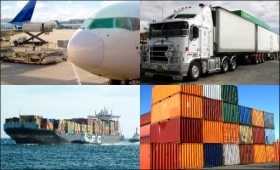|

|
GST to bring down operational cost of logistics industry
|
|

|
|
| Top Stories |
 |
|
|
|
SME Times News Bureau | 07 Jul, 2017
The roll out of the Goods and Services Tax (GST) effective July 1st, 2017 would have a positive impact on the Indian logistics costs, a Leading Global Logistics Management Solution, FarEye said on Friday.
With the new GST regulation in place, logistics companies can now adapt the hub-based warehouse system as opposed to having warehouses in all major consumer states. This will bring down the inventory costs and improve operational efficiency along with fuel savings.
Furthermore, with the current regulations demanding the logistics companies to make every transaction digitally for better tax regulation, the huge emphasis would be laid on the new-age technology which will be the key driver. To make the most of the GST regulation, Logistics companies should adopt a holistic approach in integrating the 3PL partners and the 3rd party technology solutions, for building an agile and cost-effective Supply Chain.
"Integrating with IT providers that are flexible, scalable and future-oriented solution will drive the designing and execution of complex Supply Chain cycles, project management and inventory reduction in addition to on-time delivery. Complete integration with IT increases visibility and cost cutting by almost 22 percent." Kushal Nahata, Co-founder & CEO, FarEye.
In India, Logistics sector is fragmented and occupies approximately 13-14 percent of the nation's GDP.
FarEye is revolutionizing the Supply Chain across the industry verticals like FMCG, e-commerce - Logistics, Retail, Financial Services and Health care.
|
|
|
| |
|
|
|
|
|
|
|
|
|
|
|
|
|
|
| |
| Customs Exchange Rates |
| Currency |
Import |
Export |
US Dollar
|
₹91.35
|
89.65 |
UK Pound
|
₹125.3
|
₹121.3 |
Euro
|
₹108.5
|
₹104.85 |
| Japanese
Yen |
₹58.65 |
₹56.8 |
| As on 19 Feb, 2026 |
|
|
| Daily Poll |
 |
 |
| What is your primary "Make or Break" expectation from the Finance Minister this year? |
|
|
|
|
|
| Commented Stories |
 |
|
|
|
|
|
| |
|